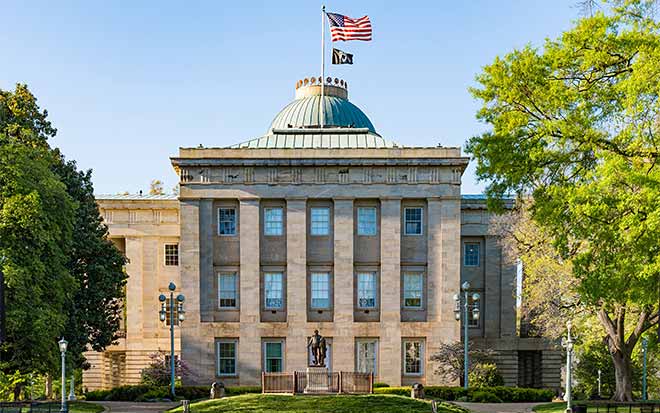Oct. 28, 2025
Old North State Report – October 27, 2025
UPCOMING EVENTS
October 27, 2025
Thinkers Lunch: Can We Still Trust the Polls?
November 13, 2025
January 12, 2026
LEGISLATIVE NEWS
MEDICAID FUNDING CLASH
The North Carolina General Assembly is facing a significant deadlock over how to fund the Medicaid rebase, a critical adjustment needed to ensure the state’s Medicaid program remains solvent and providers are paid adequately. Adding to the problem, the NCDHHS Secretary unilaterally cut Medicaid reimbursement rates, ranging from 3% to 10%, which went into effect on October 1. the Medicaid rebase impasse reflects deeper political divisions within the North Carolina legislature. The House and Senate remain at odds over both the amount of funding and the legislative strategy for delivering it. Until a compromise is reached, the uncertainty threatens the stability of Medicaid payments and the broader healthcare system in the state.
The Carolina Journal (Staff) 10/23/25
NC BUDGET STALEMATE CONTINUES
North Carolina’s budget negotiations have reached a standstill, with Republican leaders in the General Assembly unable to agree on a new two-year spending plan. The budget was legally due on July 1, and as of this week, it is more than 110 days overdue. Despite the delay, the state government continues to operate under the previous budget thanks to a 2016 law passed by Republican majorities and signed by then-Governor Pat McCrory, which allows state government to continue operation at prior years’ funding levels in the absence of a new budget.
On Thursday, Governor Josh Stein signed Senate Bill 449 into law, a mini budget bill that provides targeted funding and regulatory changes to support recovery from Hurricane Helene and other statewide needs. The bill includes provisions such as extending Golden LEAF bridge loans, delaying state cashflow loans until FEMA reimbursements are received, and funding repairs not covered by FEMA. It allocates millions for various projects: $25 million for the Pay Plan Reserve, $20.85 million for the state’s budget information system, $12 million for broadband fiber damaged by the hurricane, and additional funds for ferry maintenance, State Fairgrounds renovations, and a new human resources system.
Education funding includes support for Cooperative Innovative High Schools and the NC Promise program. Environmental and agricultural initiatives also receive funding, including $3 million for avian flu response and $700,000 for staffing at the Environmental Management Commission. The mini-budget passed overwhelmingly in both chambers—46-0 in the Senate and 104-6 in the House.
Governor Stein has proposed a $67.9 billion budget, while both legislative chambers have suggested a slightly lower figure of $65.9 billion. The differences between the proposals include the size of pay raises for state employees and teachers, and the extent of income tax cuts. Stein favors larger raises for teachers and has expressed support for the House’s proposed amounts.
North Carolina House Speaker Destin Hall declared at the close of Wednesday’s session that the House is unlikely to reconvene for further legislative business this year. As a result, six outstanding veto override attempts—targeting high-priority bills related to guns, immigration, and diversity, equity, and inclusion—are expected to remain unresolved until the short session next year.
The Center Square (Wooten) 10/22/25
The News & Observer (Bajpai) 10/24/25
NORTH CAROLINA LEGISLATURE APPROVES NEW CONGRESSIONAL MAP
North Carolina’s legislature has approved a mid-decade redrawing of its congressional map aimed at increasing the GOP’s advantage. The new lines, passed by the state Senate and affirmed by the House, would likely give Republicans 11 of the state’s 14 U.S. House seats—an increase from the current 10—fortifying their 2026 prospects. Most notably, the revised map significantly alters the 1st District, now represented by Democratic Rep. Don Davis, shifting its political composition from one Trump carried by three points in 2024 to one he would have won by about 12 points, according to General Assembly data.
Governor Josh Stein cannot veto the maps since an agreement made by state Democrats in the 1990s took redistricting out of the governor's control.
This marks North Carolina’s fifth congressional map in as many election cycles—a series of shifts that began after the 2020 census with court-drawn lines in 2022, followed by GOP-era redraws in 2024 and now in 2025 . The change aligns North Carolina with other Republican states such as Texas and Missouri that have undertaken similar mid-decade redistricting moves, even as California Democrats have responded by redrawing their own map to protect seats.
The new North Carolina map has already sparked a fresh legal challenge, as plaintiffs in a long-running lawsuit against the 2023 congressional map amended their complaint to include the newly drawn districts. The amended case seeks to halt the use of the new map in upcoming elections while litigation continues, and the court has requested input from both sides regarding how to proceed following the redrawing. Meanwhile, additional lawsuits are expected to follow, as part of a broader national trend among Republicans to redraw maps in their favor and counter-reactions from Democrats in other states.
Roll Call (Altimari & Menezes) 10/22/25




